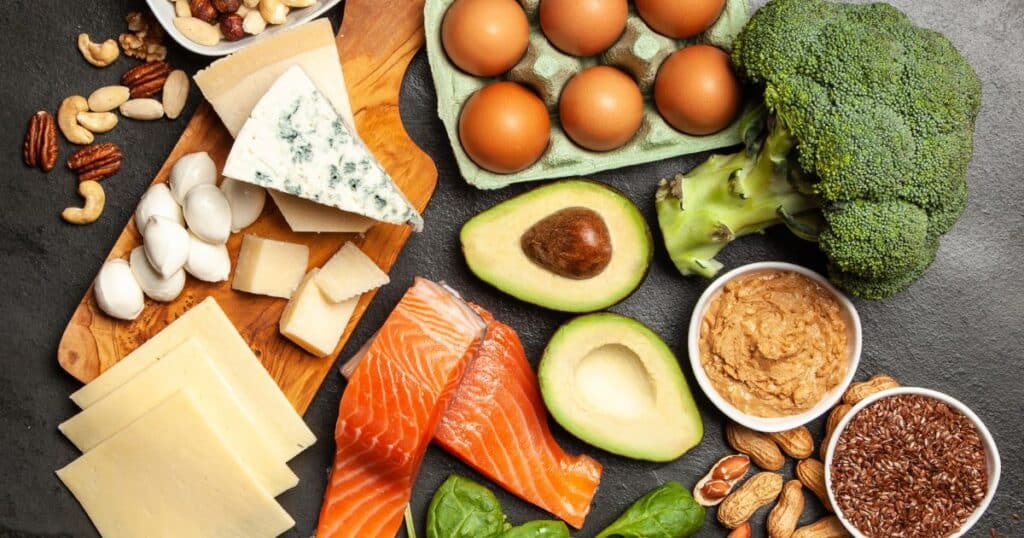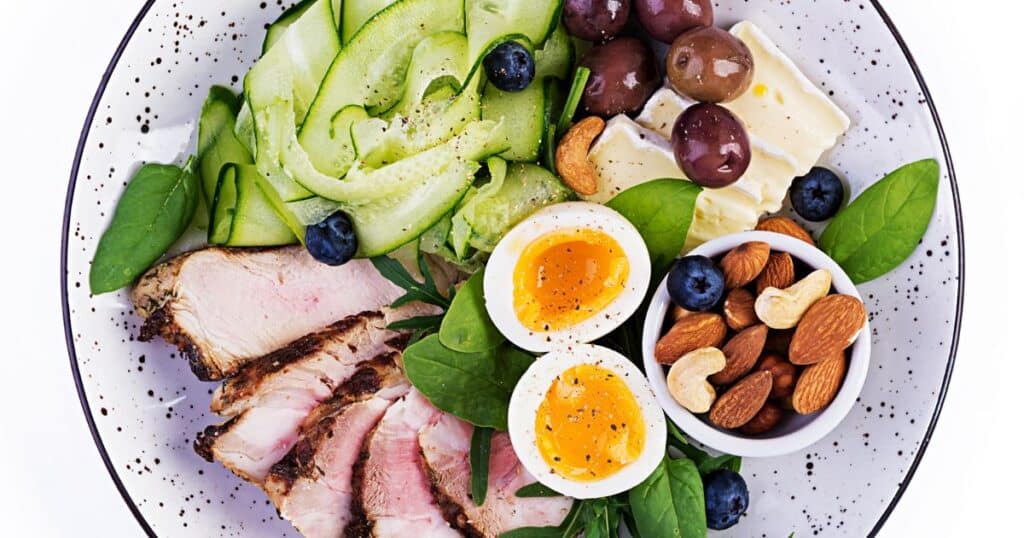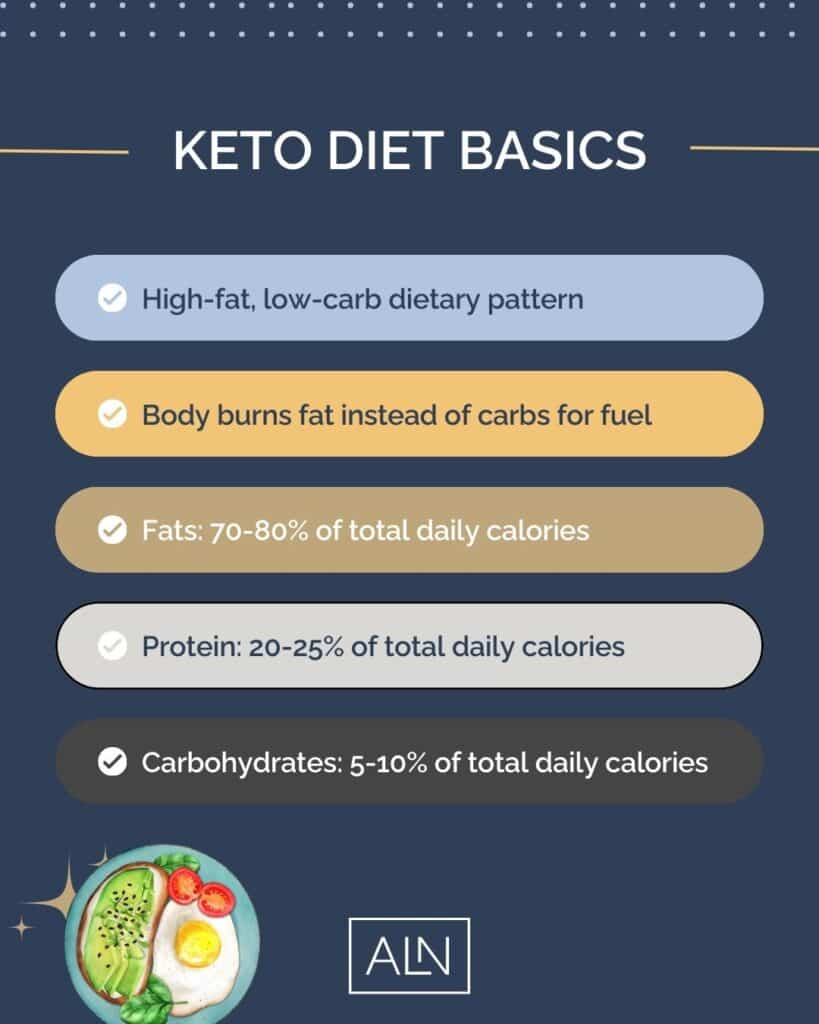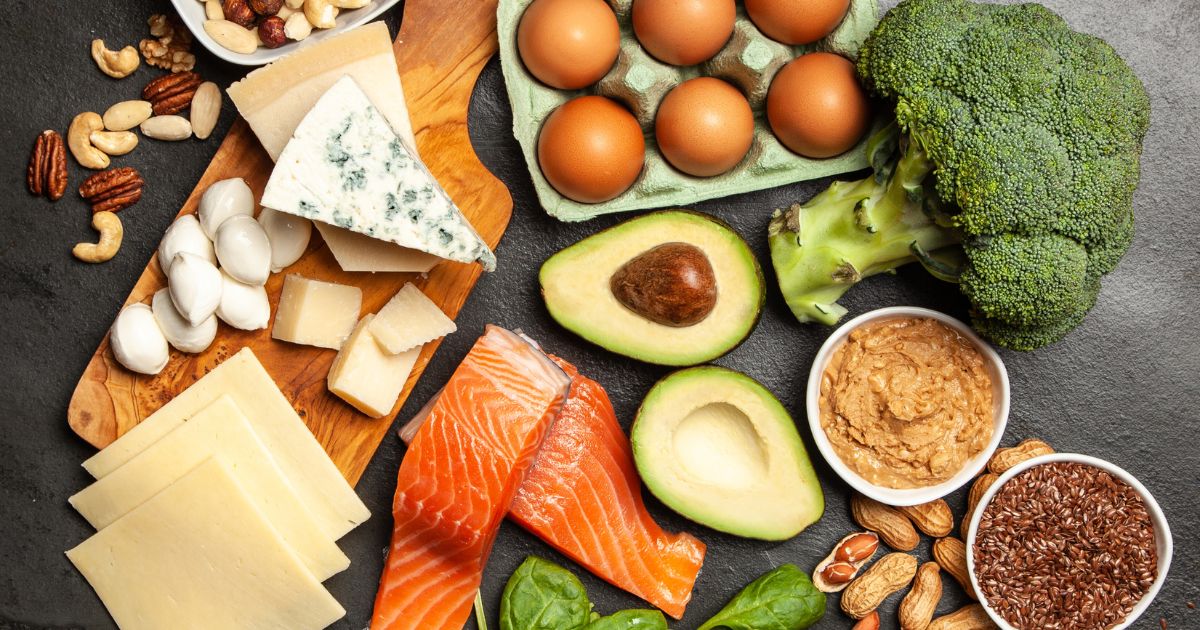RUNNING →
Level Up Your Nutrition Game With Our Freebies
Alex
I provide nutrition coaching for endurance athletes to improve performance and body composition through a simple and flexible eating style.
Hi, I'm
ATHLETE EATING GUIDE →
PROTEIN →
TRIATHLON →
RECIPES →
PERFORMANCE NUTRITION →
SUPPLEMENTS →
HOLIDAY & TRAVEL →
PLANT-BASED →
FEMALE ATHLETE NUTRITION
Explore the Blog
LEARN MORE →
ATHLETE GROCERY SHOPPING GUIDE →
RACE DAY: TRIATHLON NUTRITION PLANNER →
READY TO FUEL?
incredible value!
The fueling guide bundle serves as your one-stop-shop for strategies to fueling before, during and after your workouts.
ENDURANCE EATS
BINGE-WATCH READY!
YOUTUBE SERIES
It seems that monthly (perhaps weekly) a new diet trend is gaining in popularity. Many of these fad diets promise increased fat loss, boosted energy levels, and improved health parameters. It can be difficult to know what is indeed true and also backed by research. Most recently, a diet trend that is gaining momentum is the ketogenic (keto) diet. Let’s examine keto for athletes further.
What is the Keto Diet

The ketogenic diet, often called keto, has soared in popularity in recent years. It grabs the attention of health enthusiasts, researchers, and endurance athletes looking to boost performance.
Originally developed to treat epilepsy, this high-fat, low-carbohydrate diet pattern has now gained widespread acclaim for its potential benefits. This includes reported weight loss, diabetes management, and even mental focus among proponents. Some individuals praise its transformative effects while others caution against possible health risks. The ketogenic diet continues to be a subject of both scientific scrutiny and everyday conversation.
The Skinny on Fat in the Keto Diet
The keto diet is a high-fat, low-carbohydrate diet that aims to shift the body’s primary source of energy from carbs to fats. In a typical American (Western-type) diet, carbs are the main source of energy. However, the ketogenic diet restricts carb intake to a minimum. This is usually less than 50 grams of carbs per day for most people strictly following the plan. That’s right, unfortunately, our favorite carbohydrate-rich foods including oatmeal, bagels, bread, rice, tortillas, cereal, and also most fruits are not permitted while following a keto diet.
This carb limitation forces the body to enter a metabolic state called ketosis, where it burns fat for fuel instead of carbohydrates. As your body breaks down fat for fuel, it produces a compound known as ketones. The ketones, or ketone bodies, become your body and brain’s main source of energy. Touted benefits of following a keto diet include (though please note that all of these have not been fully supported by research):
- Weight loss and appetite control
- Decreased body fat stores
- Decrease in triglycerides
- Therapeutic for brain disorders, including epilepsy
The Basics of the Keto Diet

The keto diet emphasizes foods like meat, fish, eggs, dairy, oils, and low-carb vegetables while avoiding foods high in sugar and starch. The macronutrient composition of the keto diet varies depending on specific goals and individual needs. Though general guidelines are as follows:
- Fats: 70-80% of total daily calories
- Protein: 20-25% of total daily calories
- Carbohydrates: 5-10% of total daily calories
It is important to note that the above ratios can vary depending on the version of the ketogenic diet the individual is following, as well as individual metabolic responses.
Protein intake is moderate and adjusted according to factors such as age, activity level, and health goals. The majority of calories come from fat sources such as avocado, nuts, seeds, oils, fatty cuts of meat and fish, and butter, among others. A sample meal plan for an athlete following a strict keto diet is as follows:
- Breakfast: Eggs with cheese and chopped bacon, sauteed in onions and butter. Coffee with heavy cream
- Lunch: Large salad with hard-boiled egg and salmon, tomatoes, onions, peppers, and balsamic dressing. Topped with sliced avocado and feta cheese
- Pre-Workout Snack: Beef jerky and an extra generous handful of nuts
- Dinner: Ribeye steak with a side of broccoli and cauliflower cooked in butter
- Bedtime Snack: Chia pudding made with coconut milk and stevia

Potential for Improved Body Composition and Weight Management
Research has shown that a ketogenic diet can help with weight loss and improve blood sugar control. This research has been mostly performed in individuals with Type II diabetes and among individuals who are overweight. Other research has shown that a ketogenic can be effective for helping people to lose weight, but not more effective than a calorie-controlled diet. Overwhelming broad-scale research has not been performed in endurance sport athletes including runners, cyclists, and triathletes.
Drawbacks and Challenges of the Keto Diet
While the promise of keto for endurance athletes may sound too good to be true, unfortunately, it is. The keto diet requires strict monitoring of carb intake, limiting you to less than 50g of carbs per day. Unfortunately, this is a diet where no pancakes are allowed- boohoo! The keto diet completely neglects optimal pre-, intra, and post-workout nutrition guidelines as carbohydrates are essentially omitted. Forget the performance-boosting effects of carbohydrate loading prior to a big race if you are adhering to a keto diet.
Keto for athletes is also a dietary pattern that is difficult to sustain long-term and going off track can kick you out of ketosis, undoing your progress. Furthermore, the initial phase of implementing a ketogenic diet can result in side effects such as fatigue and nausea. The keto diet is also very low in health-promoting nutrients including dietary fiber and many essential vitamins and minerals for athletes.
Research is inconclusive on any benefits of adhering to a keto diet for endurance athletes. Keto for athletes can be dangerous and lend itself to chronic underfueling and RED-S, delayed workout recovery, and disordered eating
Carbohydrates are King When it Comes to Fueling

Popular fad diets are not ideal for endurance nutrition performance. Focus on taking a balanced and sustainable approach to your nutrition without cutting out any major food groups and vital nutrients.
Carbohydrates are premium fuel when it comes to filling your nutrition tank because carbohydrates are the most efficient source of energy. When you consume carbohydrates, your body breaks them down into glucose (sugar). Glucose will be used for exercise or converted into muscle glycogen to be stored and used later. Typically, most endurance athletes require at least 55% of their calorie intake from carbohydrates. But, this can vary based on factors such as duration and intensity of a workout and carbohydrate-loading for an upcoming race. It is important to recognize that not all carbohydrates are the same. During training, you will be consuming both simple and complex carbohydrates for fuel.
Simple Carbohydrates
Simple carbs are easy to digest and are found in raw sugar, energy gels, energy or sports drinks, energy bars, fruit and fruit juices, soda, candy, and foods with added sugars such as cookies and desserts. Foods that are high in simple carbohydrate content are low in dietary fiber and break down quickly to be used as energy. These foods are effective while training to provide quick bursts of energy.
During your training, take in enough simple carbohydrates to avoid running out of fuel in the tank (aka: “hitting a wall”). Typically 60-90g of simple, easy-to-digest carbohydrates per hour, depending on the length of the workout, is the target range for most endurance athletes. It is incredibly key to experiment with fuel sources, such as energy gels, while training. This is to ensure that you will tolerate and minimize any risk of stomach cramps and upset on race day.
Complex Carbohydrates
Complex carbs take longer to digest. They’re found in higher-fiber, nutrient-dense foods. Such as whole grains (barley, brown rice, quinoa, oats), legumes including beans and lentils, starchy vegetables such as sweet potatoes, potatoes, and pumpkin, among others. These foods are excellent to include throughout the day in meals and snacks to boost your vitamin and mineral intake and help keep you feeling satisfied.
Long-Term Sustainability of Keto for Athletes
It would be so convenient if there was one fueling plan that was perfect for every athlete. Nutrition for endurance athletes is going to be different for every athlete in what works best for them. They have different body types, training plans, food preferences, medical history, age, gender, and goals. This is why a sports dietitian nutritionist may recommend a variety of options to find what works best for you.
As an endurance athlete, it is important to follow a flexible and balanced nutrition program where you are not cutting out major food groups. Remember that performance nutrition should be sustainable in the long term and not restrictive.
Conclusion
While we respect athletes’ decisions to eat and follow a keto diet, it is not an eating style that the ALN dietitian team works with endurance athletes on. Our goal is to find a sustainable and nutritionally adequate eating pattern for our athletes to maintain life long that supports their health and endurance performance goals.
If you are looking to enhance your performance nutrition with a flexible approach, be sure to reach out. My team and I are wholeheartedly invested in our athletes.
Alex
I provide nutrition coaching for endurance athletes to improve performance and body composition through a simple and flexible eating style.
Hi, I'm
LEARN MORE →
take the quiz!
Let's discover your Endurance Nutrition IQ
How well do you know your fueling? Answer these questions and let's see where your endurance nutrition knowledge is at!
Take the quiz
level up your nutrition game with these freebies
free downloadS
Protein-Packed 10-Day Sample Meal Plan
Athlete Eating Guide
Athlete Grocery Shopping Guide
1
2
3
Inspiration to fit 120 grams of protein into your day
Planning what goes on your plate
Putting the right foods in your grocery cart
